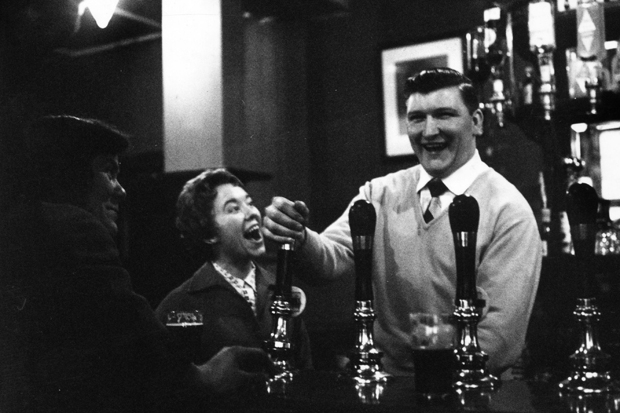If you’ve missed the endless articles whingeing about pub closures, it must be because you’ve been too blotto to focus. It is impossible for a mediocre drinking hole to close its doors for the last time without some thirsty hack reaching for his collected George Orwell essays and waxing lyrical about the Moon Under Water and the death of the English pub. It’s true that many pubs are closing (27 a week, according to the Campaign for Real Ale) and demographic changes have called last orders for numerous decent pubs — and some gems — in areas where changing populations have seen demand dissolve quicker than a morning Alka-Seltzer. But the main reason why most pubs closed is simple: they were dreadful.
When I consider all the bad pubs I’ve frequented it’s hard to select the worst. I might have cited a certain moth-infested dive in Kennington, but so many letters had fallen off its sign I’m not sure what it was called. Another horror was a pub in Portsmouth where on arrival we were greeted by two growling rott-weilers (chained, fortunately) and an elderly customer in the corner who appeared to have wet himself. Both those pubs have closed — mercifully — but of the rest that have survived, what is it that distinguishes the great pubs from the mediocre? The Lagavulin 16 from the own-brand blended cough mixture?
These days, it’s not really about the beer — that battle has largely been won. Even grim chain pubs sell craft beer and the days when it took serious research to find a decent bitter are long gone. For me, at least, the mark of a good pub is not its look or its location. There is something to be said for a village inn where your pint of foaming ale is brought to your table next to an open fire, but it’s as easy to have a great time in a 1970s estate pub, if it has the right atmosphere. And this is created (or destroyed) by the pub landlord.
Pub landlords don’t just employ staff and pull pints; they decide what happens in their pub in the way a curator decides what goes into an art gallery. Just as the latter can decide whether he’d like a room full of Raphaels or a performance artist asleep in a dead bear, a landlord can preside over civilised ambience — with proper beer, no fruit machines and chairs made for comfort — or he can pump dance music through the stereo and offer two-for-one shots of Jagermeister to punters seated on working recreations of medieval torture devices. Of course, some pub ‘managers’ are only obeying orders — but really good pubs are run by people who know what they are doing and can call the shots.
Take the Speaker in Westminster: no piped music, five real ales — always well kept. Although it’s a central London pub, it is a haven for decent booze and good conversation, which reflects the style of its experienced and engaging landlord, Dennis Reed. In old school Telegraph obit style, he would be described as a confirmed bachelor. (A bonus for some of his trusted regulars are accounts of his holidays to Sitges conveyed in eye-watering detail.)
Another superlative host/benign dictator presides at the Seven Stars at the back of the Royal Courts of Justice. Parched lawyers have been using it since the early 17th century and it reeks of history. But its present is as illustrious as its past, thanks to its long-term landlady Roxy Beaujolais. To watch her reduce a bunch of rowdy rugby lads on a stag weekend to a mound of quivering bemuscled jelly is quite something to behold. However, to her regulars she is the acme of civilised companionship.
The best landlords don’t suck up to their customers. At the Coach and Horses in Greek Street, Norman Balon’s reputation for rudeness was such that it felt like a snub if the service came without a snarl. And I have fond memories of a pub in the shadow of York Minster, where the nickname of the long-gone landlord — Barry the Bastard — wasn’t earned as a result of his ability to sweet-talk the clientele. (In fact, his more commonly used nickname was less alliterative and unprintable in a respectable organ.) But in their heyday, both pubs were packed with drinkers who wanted genuine character rather than conveyor-belt ‘customer service’.
Great pubs don’t happen by accident. Some clever person has made them happen, through the choice of staff, drinks, decor, furnishings and, more importantly, by stamping their personality on the pub in a way which makes it a relaxed but stimulating place to talk, eat and drink. Forget about ‘save the pub’ — we need to save the landlord.





Comments